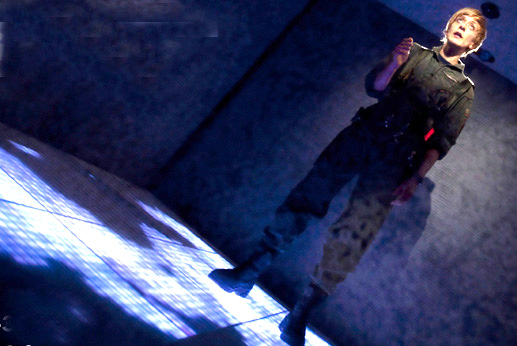From a stone in the hand, to a spear, to a bow, to a gun, to an artillery piece, to a plane, to a rocket, the evolution of the means of dispatching our enemies is one of increasing efficiency – and distance. Grounded gives us a glimpse into the world of the drone pilot, here an unnamed woman, grounded initially as a result of pregnancy, but subsequently by being the pilot (‘chaircrew’) of a Reaper drone flying missions over Afghanistan.
This performance by Lucy Ellison is as intense and concentrated a piece of acting as you are likely to find anywhere on the contemporary stage as she charts the journey from proud pilot to ‘God of guilt’ with the power to destroy the ‘guilty’ from the other side of the world.
Bristling with swagger, confidence and certainty, she is the embodiment of a well-trained body and disciplined mind. Sex is matter-of-fact and childbirth the subject of almost detached interest. After initial resistance to the move away from flying real aeroplanes she eventually delights in the power to wreak havoc on the bad guys with the touch of a button. However the detachment from the reality on the ground eventually takes its toll as the gray landscape of the screen with its ‘putty’ figures becomes confused with her own geography and the targets become uncannily like her own family. The psychological stress is unsustainable and leads, perhaps inevitably, to an eventual breakdown and subsequent court-martial after a failure to take out a target.
George Brant’s writing is spare and concise, drawing us in to his protagonist’s mind. He has a convincing grasp of the argot of the US air force and is not without wit as when the pilot bemoans: ‘The Odyssy would have been a different kind of book if Odysseus had to go home every night’. His focus on his theme is clear without being heavy-handed.
The set, by Oliver Townsend is similarly spare. It is an internally lit cube of about three metres covered in a slightly opaque yet transparent gauze, like a Damian Hurst exhibit, a kind of self-made prison or asylum. Moving close to the near head-high lights has the effect of producing something like a close-up as the light illuminates her face, helping the sense of movement in the restricted space. It’s a clever device.
The direction by Christopher Haydon gets the most from the scenario, leading his actress in such a way as to maintain interest with great economy of stagecraft.
George Brant does not offer any alternative point of view or any answers, but he does raise some fundamental, important and urgent questions about the way we go about killing one another. This is theatre at its most vital, brilliantly acted. ★★★★☆ Graham Wyles 29/01/15


